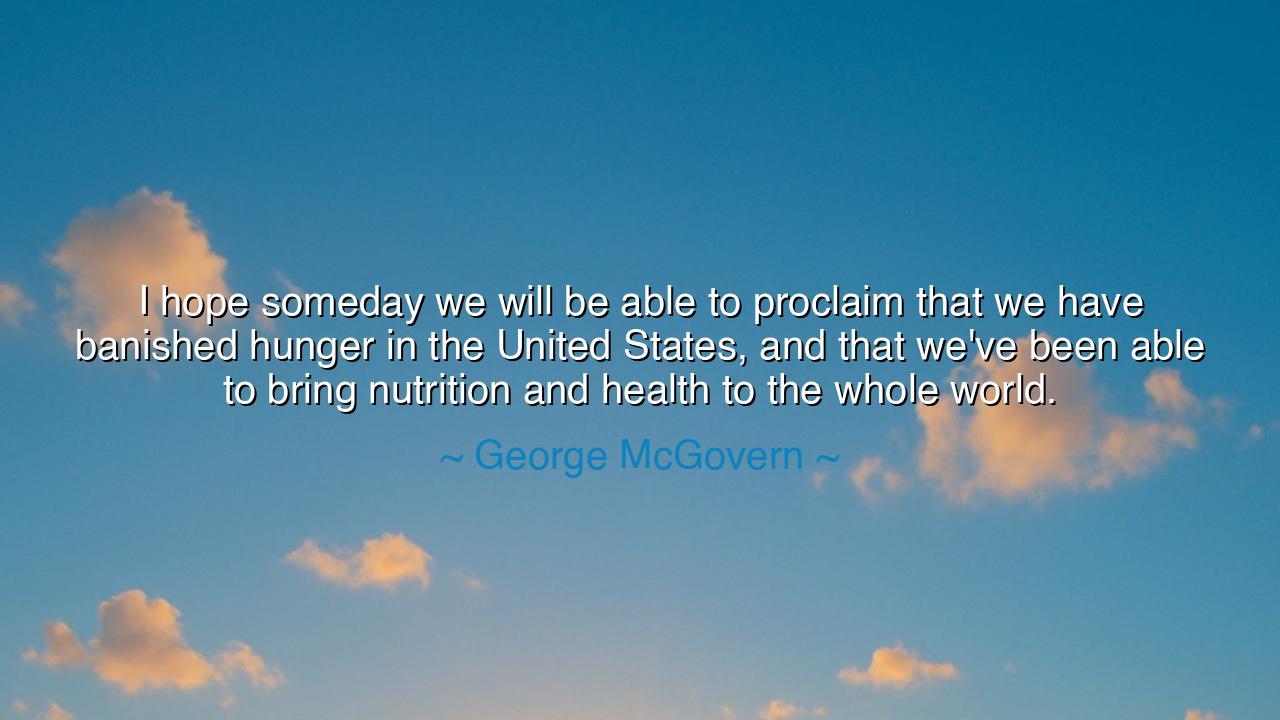
I hope someday we will be able to proclaim that we have banished
I hope someday we will be able to proclaim that we have banished hunger in the United States, and that we've been able to bring nutrition and health to the whole world.






In the noble words of George McGovern, the statesman and humanitarian, we hear the echo of a dream that rises from the deepest well of human compassion: “I hope someday we will be able to proclaim that we have banished hunger in the United States, and that we've been able to bring nutrition and health to the whole world.” These words are not merely a political aspiration — they are a prayer, a moral summons to the conscience of humankind. For hunger is not just the absence of food, but the absence of justice; health is not merely the strength of the body, but the balance of society itself. McGovern, who had seen both war and want, spoke these words as both a man of government and a man of heart — one who understood that no nation can truly call itself great while even one child sleeps with an empty stomach.
George McGovern, born into the modest plains of South Dakota, came from a world where hardship was not an idea, but a reality. The son of a Methodist minister, he grew up during the Great Depression — an era when hunger was not distant, but lived and felt in every home, on every farm, in every hollowed town. From those roots grew a man who carried empathy as his armor and justice as his cause. As a senator and advocate for world hunger relief, he worked tirelessly to expand food programs, both in America and abroad. His leadership in the creation of the Food for Peace program, and his partnership with global initiatives to combat malnutrition, marked him as one who understood that the strength of a people begins with the nourishment of its weakest.
The meaning of McGovern’s words lies not only in their hope but in their recognition of our shared responsibility. Hunger, he reminds us, is not a curse of nature — it is a wound of neglect. The Earth yields more than enough to feed every human being, yet millions suffer want because of greed, conflict, and indifference. To banish hunger, therefore, is not merely to provide food, but to restore balance — to act with compassion, to build systems of fairness, to make the wellbeing of others our measure of progress. McGovern’s vision is thus a spiritual one: a world where nutrition is not charity, but a right; where health is not privilege, but inheritance.
History has seen glimpses of this dream made flesh. Consider the efforts of Norman Borlaug, the agricultural scientist who led the Green Revolution — a movement that transformed famine-stricken nations into lands of plenty. Through his work, wheat yields multiplied, and millions were spared from starvation. Yet even Borlaug, a man hailed as having saved over a billion lives, warned that the fight was not over. He knew, as McGovern did, that hunger is not only a matter of crops, but of compassion — that without justice and will, abundance can still coexist with emptiness. Their labors remind us that the work of feeding humanity is eternal, and that every generation must take up the mantle anew.
And yet, McGovern’s dream was not only for the world beyond — it was for the nation he called home. In the United States, even amidst wealth and innovation, he saw children going without breakfast, families choosing between medicine and meals, elders hungry in silence. To him, this was a moral contradiction — a failure not of capacity, but of care. He believed that a country capable of reaching the moon should also be capable of feeding its people. And so he spoke, again and again, for policies of compassion — for school meals, for food stamps, for agricultural reform — knowing that a society’s greatness is measured not by its power, but by its mercy.
In his hope to “bring health to the whole world,” McGovern’s words transcend politics and touch upon something eternal. To bring health is to bring wholeness — to restore the body, the mind, and the spirit of humanity. It is a call to unity, to the recognition that no nation can thrive while others starve, and no individual can find peace while another suffers. His dream was vast because it was human; his vision was bold because it was kind. And though the struggle continues, every meal given, every life nourished, every act of empathy brings us closer to that radiant horizon where his hope becomes reality.
So, dear listener, let this be your inheritance from the wisdom of George McGovern: never turn away from the suffering of the hungry. Let compassion be your policy, and service your creed. Begin where you stand — feed one, heal one, care for one — for from such small acts grows the kingdom of mercy. Support those who labor to end hunger; speak for those who cannot. Remember that nutrition is the seed of learning, health the root of happiness, and justice the sunlight that makes them grow.
And when the day comes — as McGovern dreamed — when no child hungers and no mother weeps for lack of bread, then we may truly say that we have fulfilled the highest calling of civilization. For in the end, the measure of humanity is not how far it reaches into the stars, but how deeply it cares for those who dwell upon the earth. To banish hunger is to honor life itself, and to bring health to the world is to fulfill the sacred duty of being human.






AAdministratorAdministrator
Welcome, honored guests. Please leave a comment, we will respond soon